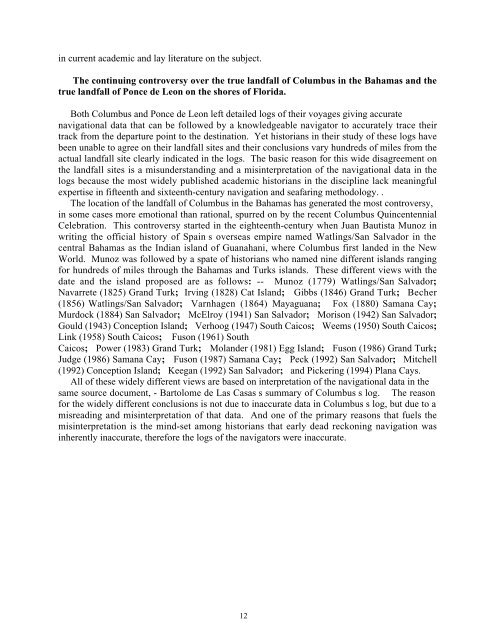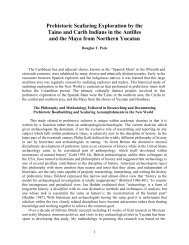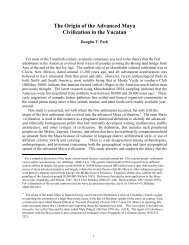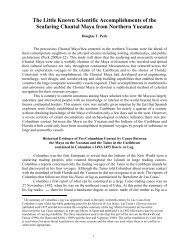The History of Early Dead Reckoning and - New World Explorers
The History of Early Dead Reckoning and - New World Explorers
The History of Early Dead Reckoning and - New World Explorers
Create successful ePaper yourself
Turn your PDF publications into a flip-book with our unique Google optimized e-Paper software.
in current academic <strong>and</strong> lay literature on the subject.<br />
<strong>The</strong> continuing controversy over the true l<strong>and</strong>fall <strong>of</strong> Columbus in the Bahamas <strong>and</strong> the<br />
true l<strong>and</strong>fall <strong>of</strong> Ponce de Leon on the shores <strong>of</strong> Florida.<br />
Both Columbus <strong>and</strong> Ponce de Leon left detailed logs <strong>of</strong> their voyages giving accurate<br />
navigational data that can be followed by a knowledgeable navigator to accurately trace their<br />
track from the departure point to the destination. Yet historians in their study <strong>of</strong> these logs have<br />
been unable to agree on their l<strong>and</strong>fall sites <strong>and</strong> their conclusions vary hundreds <strong>of</strong> miles from the<br />
actual l<strong>and</strong>fall site clearly indicated in the logs. <strong>The</strong> basic reason for this wide disagreement on<br />
the l<strong>and</strong>fall sites is a misunderst<strong>and</strong>ing <strong>and</strong> a misinterpretation <strong>of</strong> the navigational data in the<br />
logs because the most widely published academic historians in the discipline lack meaningful<br />
expertise in fifteenth <strong>and</strong> sixteenth-century navigation <strong>and</strong> seafaring methodology. .<br />
<strong>The</strong> location <strong>of</strong> the l<strong>and</strong>fall <strong>of</strong> Columbus in the Bahamas has generated the most controversy,<br />
in some cases more emotional than rational, spurred on by the recent Columbus Quincentennial<br />
Celebration. This controversy started in the eighteenth-century when Juan Bautista Munoz in<br />
writing the <strong>of</strong>ficial history <strong>of</strong> Spain s overseas empire named Watlings/San Salvador in the<br />
central Bahamas as the Indian isl<strong>and</strong> <strong>of</strong> Guanahani, where Columbus first l<strong>and</strong>ed in the <strong>New</strong><br />
<strong>World</strong>. Munoz was followed by a spate <strong>of</strong> historians who named nine different isl<strong>and</strong>s ranging<br />
for hundreds <strong>of</strong> miles through the Bahamas <strong>and</strong> Turks isl<strong>and</strong>s. <strong>The</strong>se different views with the<br />
date <strong>and</strong> the isl<strong>and</strong> proposed are as follows: -- Munoz (1779) Watlings/San Salvador;<br />
Navarrete (1825) Gr<strong>and</strong> Turk; Irving (1828) Cat Isl<strong>and</strong>; Gibbs (1846) Gr<strong>and</strong> Turk; Becher<br />
(1856) Watlings/San Salvador; Varnhagen (1864) Mayaguana; Fox (1880) Samana Cay;<br />
Murdock (1884) San Salvador; McElroy (1941) San Salvador; Morison (1942) San Salvador;<br />
Gould (1943) Conception Isl<strong>and</strong>; Verhoog (1947) South Caicos; Weems (1950) South Caicos;<br />
Link (1958) South Caicos; Fuson (1961) South<br />
Caicos; Power (1983) Gr<strong>and</strong> Turk; Mol<strong>and</strong>er (1981) Egg Isl<strong>and</strong>; Fuson (1986) Gr<strong>and</strong> Turk;<br />
Judge (1986) Samana Cay; Fuson (1987) Samana Cay; Peck (1992) San Salvador; Mitchell<br />
(1992) Conception Isl<strong>and</strong>; Keegan (1992) San Salvador; <strong>and</strong> Pickering (1994) Plana Cays.<br />
All <strong>of</strong> these widely different views are based on interpretation <strong>of</strong> the navigational data in the<br />
same source document, - Bartolome de Las Casas s summary <strong>of</strong> Columbus s log. <strong>The</strong> reason<br />
for the widely different conclusions is not due to inaccurate data in Columbus s log, but due to a<br />
misreading <strong>and</strong> misinterpretation <strong>of</strong> that data. And one <strong>of</strong> the primary reasons that fuels the<br />
misinterpretation is the mind-set among historians that early dead reckoning navigation was<br />
inherently inaccurate, therefore the logs <strong>of</strong> the navigators were inaccurate.<br />
12





